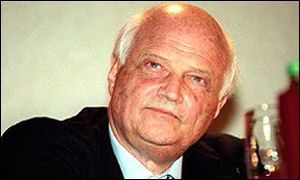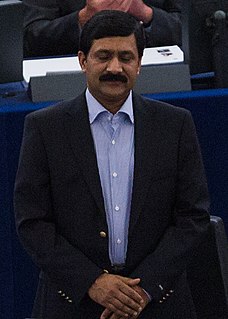A Quote by Mark Twain
Few things are more irritating than when someone who is wrong is also very effective in making his point.
Related Quotes
At one point, for example, [Donald Trump] argued that he knew much more than military leaders about the pursuit and defeat of ISIS. His assuredness of his own correctness seems also rooted in arrogance reflecting his fundamental insecurity. This insecurity and his belief in his own rightness, when combined with his success at making money, leads him to be self-reliant in his decision-making, which could result in his taking risks with threatening or using nuclear weapons.
You can have large projects and implement them by means of a few of the smallest things. Or you can use weak means that are more effective than strong ones, as Paul also said in his First Letter to the Corinthians. [...] The wisdom of discernment redeems the necessary ambiguity of life and helps us find the most appropriate means, which do not always coincide with what looks great and strong.
An effective leader is willing to think about what's happening and how to understand what's going on. Facilitating flow and making others more conscious of it, the leader communicates an awareness of process to the group, making them more aware of their energies and options. One important principle is to keep track of who has not spoken. ... It's also important to notice when people do speak out but are not heard. Effective leaders practice patience, reminding themselves to wait and observe, remembering that there's always more going on in a group than we're consciously aware of.
...There is no end to the making and selling of things there is no end to the making and selling of things there is no end... Man, it occurs to me, is a joyful, buying-and-selling piece of work. I have been wrong, dead wrong, when I've decried consumerism. Consumerism is what we are. It is, in a sense, a holy impulse. A human being is someone who joyfully goes in pursuit of things, brings them home, then immediately starts planning how to get more.
There are many more languages than we think: and man betrays himself more often than he desires. How things speak! - but there are very few listeners, so that man can only, as it were, chatter on in the void when he pours out his confessions: he squanders his ‘truths’, as the sun does its light. - Isn’t it rather a pity that the void has no ears?
Though it's hard to be completely certain about things like this, I have a suspicion that only someone with deep freedom (one who makes decisions for reasons that are his own) and who's also a moral being (can experience goodness) can have a meaningful friendship with God. If friendship with God and sharing in His happiness are good things (and it seems they are), then making a creature who could enjoy these things is also a good thing, even if it comes with a liability. There's a risk.
None has more frequent conversations with a disagreeable self than the man of pleasure; his enthusiasms are but few and transient; his appetites, like angry creditors, are continually making fruitless demands for what he is unable to pay; and the greater his former pleasures, the more strong his regret, the more impatient his expectations. A life of pleasure is, therefore, the most unpleasing life.
How many of us have conflicts with someone else- and how many of us pray for that person? We have individuals with whom we are competitive, or whom we dislike or have a quarrel with; but very few of us have true enemies in the martial sense. And yet if Lincoln could pray fervently- and contemporary reports indicate he did- for the people who were opposing him, how much more can we do for someone we just find a little irritating?
We hope that there will be nothing that conflicts with anybody's religion or faith. We would never say a person's religion is not effective. We say, 'Would you be interested in something more effective?' We always put things in an optimistic, progressive perspective. 'Do you want to make your prayers more effective? Not that they are not effective, but do you want to help them become more effective?'






































